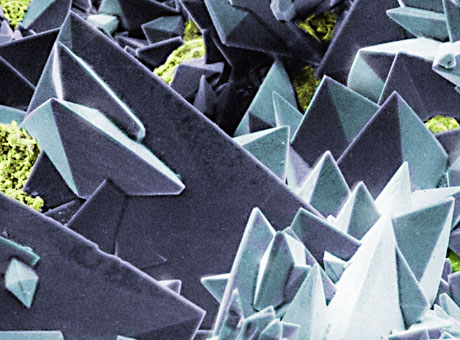
The surface of a kidney stone with calcium oxalate crystals

The surface of a kidney stone with calcium oxalate crystals
Anyone who has suffered from kidney stones is keenly aware of the lack of drugs to treat the condition, which often causes excruciating pain.
A new mouse study, however, suggests that a class of drugs approved to treat leukemia and epilepsy also may be effective against kidney stones.
The drugs are histone deacetylase inhibitors, or HDAC inhibitors for short. The researchers found that two of them — Vorinostat and trichostatin A — lower levels of calcium and magnesium in the urine. Both calcium and magnesium are key components of kidney stones.
The research is available online in the Journal of the American Society of Nephrology.
“We’re hopeful this class of drugs can dissolve kidney stones because its effects on reducing calcium and magnesium are exclusive to kidney cells,” said senior author Jianghui Hou, PhD, assistant professor of medicine. “In the mice, we achieved dramatic effects at a fraction of the dosage used to treat leukemia and without significant side effects.”
Most kidney stones form when the urine becomes too concentrated, allowing calcium and magnesium to crystallize and stick together. Intense pain develops when stones get stuck in the urinary tract and block the flow of urine.
Diet can play a role in the condition. Not drinking enough water or eating a diet with too much salt, which promotes calcium to be released into the urine, increases the risk of stones. Some people also are genetically prone to developing kidney stones, and they naturally release too much calcium into the urine.
Typically, doctors recommend drinking lots of water to help pass kidney stones from the body. Thiazide, a drug used to treat high blood pressure, sometimes is prescribed to treat the stones because it reduces calcium in the urine. But the drug also increases magnesium in urine, countering its effectiveness against kidney stones.